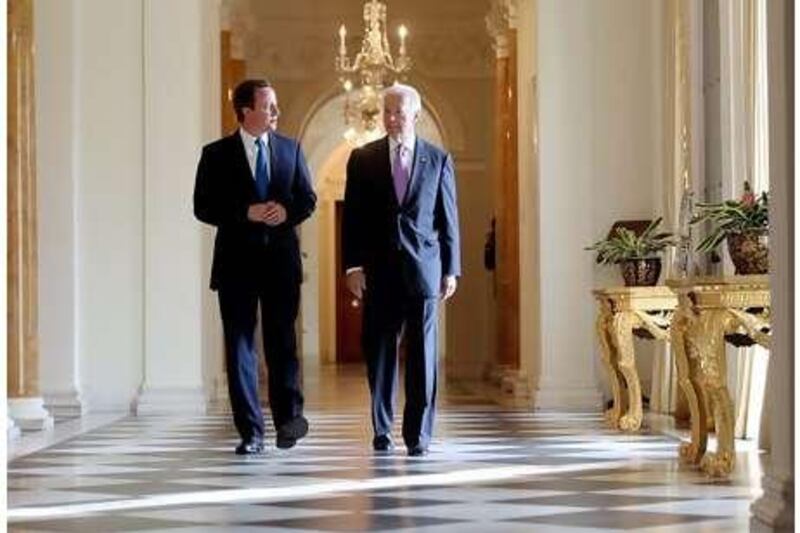The British prime minister David Cameron may not want to talk about BP in meetings this week with the US President Barack Obama but the oil company's new status as public enemy number one in the US will leave Mr Cameron no option. On the way to Washington on his first visit to the US since taking office in May, Mr Cameron told reporters he wanted to talk about Afghanistan, Middle East peace prospects and the global economy. The US president will want to discuss BP and its series of misadventures, which are overshadowing the "special relationship" between the US and the UK.
Already, Mr Cameron has had to make concessions to US politicians who are seeking to nail BP for wrongdoing, three months after the company's Macondo well blew out and started spilling crude into the Gulf of Mexico. Yesterday, Mr Cameron's spokesman said the prime minister would, after all, meet four US senators who were angered by the release of the Lockerbie bomber and wanted the UK government to hold an inquiry into any role BP may have had in the affair. Mr Cameron said on Monday that he would not have time for such a meeting. "The prime minister recognises the strength of feeling and knows how important it is to reassure the families of the victims," the spokesman said yesterday. "We are happy to see them face to face and find time in the diary."
The Democratic senators Chuck Schumer and Kirsten Gillibrand of New York and Frank Lautenberg and Robert Menendez of New Jersey said they hoped to discuss "what we can all do to provide greater transparency into the circumstances surrounding the release, address the injustice, and ensure that a similar mistake is not repeated". They said the US secretary of state Hillary Clinton had advised them she had asked the UK government to "review the facts and circumstances" of the release of Abdelbaset al Megrahi and his repatriation to Libya.
Mr al Megrahi, who has terminal cancer, was the only person convicted of the 1988 bombing of a Pan American World Airways flight over the Scottish town of Lockerbie, which killed 270 people, mostly US citizens. Scotland's government, which is partially autonomous from its English counterpart, cited compassionate grounds in ordering Mr al Megrahi's release last year from the Scottish prison where he was serving a life sentence.
Mr Cameron has said the release was "a mistake" but that there was no evidence suggesting BP lobbied on behalf of Mr al Megrahi in order to protect its US$900 million (Dh3.3 billion) offshore oil exploration deal with Libya. BP has said it lobbied the UK government three years ago to complete a prisoner-transfer agreement with Libya when the UK was reviving its commercial relationship with the North African state.
Mr Cameron, whose party was not in power at the time, said he had no direct knowledge of the talks but that they did not specifically address Mr al Megrahi's case. William Hague, the UK foreign secretary, and Libya's top oil official Shokri Ghanem have also said BP was not involved in the release decision. "BP was awarded the deal because it offered the best proposal compared to its competitors," Mr Ghanem, who led Libya's contract negotiations, told Dow Jones.
BP, which has spent almost $4bn trying to shut down and clean up the worst oil spill in US waters ever, could face a seven-year ban on new offshore drilling in the US after a committee of the country's House of Representatives voted to ban licences for any company with 10 or more workplace fatalities. The explosion that sank the Deepwater Horizon oil platform, which was drilling BP's stricken well, killed 11 people.
Robert Wine, a BP spokesman, said the proposal would not affect BP's existing US oil production. "BP's day-to-day operations are continuing after the spill. There are a lot of very steady, good operations around the rest of the world," he said. On Monday, BP and the German gas and power firm RWE announced they had signed a $9bn deal with Egypt to produce gas from deepwater concessions in the Mediterranean Sea. Demonstrating further international support for BP, the energy minister of Azerbaijan on Saturday said the company would remain a partner in the huge Shah Deniz gas development.
In addition, BP and China National Petroleum Corporation have announced plans to increase the crude production capacity of Iraq's biggest oilfield by the end of this year. Last week, BP agreed to acquire the cellulosic biofuels business of the US industrial enzyme developer Verenium for $98.3m. It said it intended to become a leader in the emerging US cellulosic biofuels industry. tcarlisle@thenational.ae





